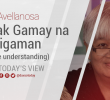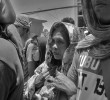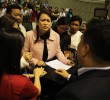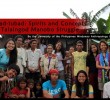By CAROL PAGADUAN-ARAULLO
Streetwise / Business World
Posted by Davao Today
Two surveys done by reputable polling groups last month show presidential candidate Senator Manny Villar closing the gap between him and erstwhile frontrunner Senator Noynoy Aquino. Mr. Villar got a big leap in his ratings while Mr. Aquino slid down considerably; in the case of the Pulse Asia survey, the current difference between the two is considered statistically negligible.
The latest survey results come as a surprise since they were taken at the height of the raging controversy over the C-5 highway that anti-Villar senators kicked into high gear with a Senate report censuring Mr. Villar as having profited immensely from the project. The attacks and counterattacks, including many below the belt, have been hogging the headlines for almost two weeks. Many predicted it would be the undoing of Mr. Villar since it took him some time before he appeared in the Senate to dispute the charges and defend himself.
Mr. Aquino, on the other hand, persisted in presenting himself as the ultimate antidote to corruption. He stood primarily if not solely on his pedigree as the son of the martyr, Ninoy Aquino, and the vaunted icon of democracy, Cory, and his non-controversial if lackluster track record as a legislator. His camp expected he would benefit from the expose on his main rival’s alleged corrupt dealings. And yet it appears that people are not satisfied with Mr. Aquino’s claim to an unblemished name and lineage; they want to know what he stands for, has accomplished and aims to accomplish.
Whatever the reason behind the survey results and regardless of the how accurate or valid, the fact stands out that corruption is not the only issue in this elections, and may not even be the most important for the people.
Corruption is truly a big issue, underscored by its intractability, its scale and the brazenness by which it is carried out by the highest government officials and the biggest names in business in complicity with foreign governments and corporations. The NBN-ZTE scam easily comes to mind.
Yet it is only part of the bigger problem that keeps the vast majority of our people poor and miserable. To them, the most important problem, because it affects their lives directly and on a daily basis, is the state of the economy. The Arroyo regime’s barrage of paid advertisements citing glowing economic figures and touted accomplishments notwithstanding, people perceive the economy as unable to provide jobs and their basic needs.
Perhaps Mr. Villar’s pitch about helping people out of their poverty the way he purportedly conquered it himself through dint of hard work and perseverance connected to more people seeking a way out too. At least, the surveys indicate that Mr. Villar’s massive advertising in the last two months made a dent and overcame questions about the veracity of his claims and the purity of his intentions. (The oft-repeated prediction by his critics is that he would recoup his humongous campaign expenses the minute he won the presidency with more crooked deals rather than fulfill his promise of lifting the people out of poverty.)
We need not assume the accuracy or reliability of these surveys in reflecting the public pulse but certainly we can deduce a growing clamor among the people for ventilating and facing the issues squarely as shown by the many debates and forums with the presidential candidates. While it may still be too early to draw trends much less conclusions, we can take note that people seem to be more critical, not easily swayed by emotional appeal and demanding more substance from candidates.
A group calling itself Pagbabago!, People’s Movement for Change, has drawn up a “people’s criteria” with which to measure candidates in the May elections. (Check them out at http://www.pagbabago.org/cms/) They propose that the criteria be used to measure both the platforms and the track records of all the presidentiables and their running mates as well as the senatorial candidates.
Twelve sets of questions are offered to the electorate covering a comprehensive range of policy questions and concrete issues – from the economy, to human rights, to prosecuting Mrs. Arroyo and cohorts and including foreign policy questions and how to settle persistent armed conflicts.
On the economy, Pagbabago! asks those aspiring to the top posts In the land the following:
1)Will you protect the national patrimony and environment by opposing large-scale, export-oriented, and foreign-led extractive industries such as mining and oil exploration?
2)Will you work for genuine agrarian reform anchored on the distribution of land to the tillers? Are you in favour of scrapping schemes such as the stock-distribution option, land use conversion and others that have allowed evasion of land reform and endangered food security?
3)Will you work for national industrialization? Will you reverse policies of liberalization, privatization and deregulation? Will you keep economic protectionist measures, restrictions on foreign ownership of land in the Philippine Constitution?
4)Will you promote job creation and uphold job security by protecting domestic industry? Do you support the demand of workers for an increase in minimum wage? Will you reverse labor export and labor contractualization policies to protect working people’s rights and promote their welfare?
Whether or not one agrees with the point of view of Pagbabago!, its attempt to raise the issues more sharply and thus help differentiate the candidates from one another based on their principled stand and their political practice is more in tune with what the surveys are starting to show.
Woe to the candidates who choose to ignore the rising discontent with an electoral campaign brimming with populist rhetoric, image building and mud slinging. More surprises are in store from an awakening and discerning people. (Business World/Posted by Davao Today)

![[STANDPOINT] Illegal drugs and the NIMBY mindset](https://davaotoday.com/wp-content/uploads/2016/09/Mags-Maglana_UPMIN-Sept.-20-110x100.jpg)








